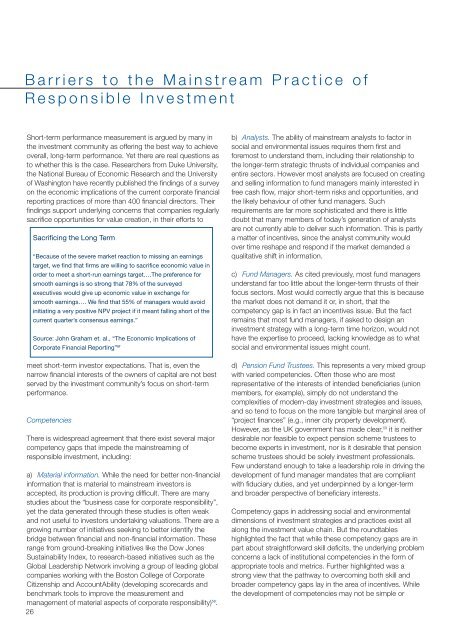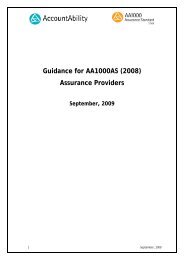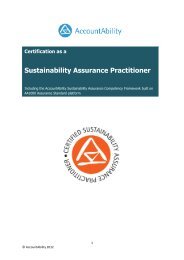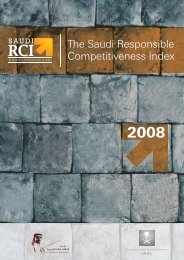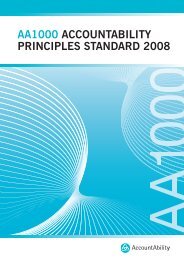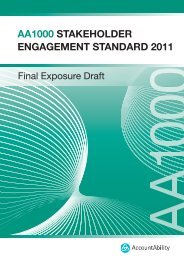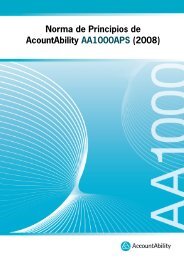Mainstreaming Responsible Investment - AccountAbility
Mainstreaming Responsible Investment - AccountAbility
Mainstreaming Responsible Investment - AccountAbility
You also want an ePaper? Increase the reach of your titles
YUMPU automatically turns print PDFs into web optimized ePapers that Google loves.
Barriers to the Mainstream Practice of<br />
<strong>Responsible</strong> <strong>Investment</strong><br />
Short-term performance measurement is argued by many in<br />
the investment community as offering the best way to achieve<br />
overall, long-term performance. Yet there are real questions as<br />
to whether this is the case. Researchers from Duke University,<br />
the National Bureau of Economic Research and the University<br />
of Washington have recently published the findings of a survey<br />
on the economic implications of the current corporate financial<br />
reporting practices of more than 400 financial directors. Their<br />
findings support underlying concerns that companies regularly<br />
sacrifice opportunities for value creation, in their efforts to<br />
Sacrificing the Long Term<br />
“Because of the severe market reaction to missing an earnings<br />
target, we find that firms are willing to sacrifice economic value in<br />
order to meet a short-run earnings target….The preference for<br />
smooth earnings is so strong that 78% of the surveyed<br />
executives would give up economic value in exchange for<br />
smooth earnings…. We find that 55% of managers would avoid<br />
initiating a very positive NPV project if it meant falling short of the<br />
current quarter’s consensus earnings.”<br />
Source: John Graham et. al., “The Economic Implications of<br />
Corporate Financial Reporting” 57<br />
meet short-term investor expectations. That is, even the<br />
narrow financial interests of the owners of capital are not best<br />
served by the investment community’s focus on short-term<br />
performance.<br />
Competencies<br />
There is widespread agreement that there exist several major<br />
competency gaps that impede the mainstreaming of<br />
responsible investment, including:<br />
a) Material information. While the need for better non-financial<br />
information that is material to mainstream investors is<br />
accepted, its production is proving difficult. There are many<br />
studies about the “business case for corporate responsibility”,<br />
yet the data generated through these studies is often weak<br />
and not useful to investors undertaking valuations. There are a<br />
growing number of initiatives seeking to better identify the<br />
bridge between financial and non-financial information. These<br />
range from ground-breaking initiatives like the Dow Jones<br />
Sustainability Index, to research-based initiatives such as the<br />
Global Leadership Network involving a group of leading global<br />
companies working with the Boston College of Corporate<br />
Citizenship and <strong>AccountAbility</strong> (developing scorecards and<br />
benchmark tools to improve the measurement and<br />
management of material aspects of corporate responsibility) 58 .<br />
26<br />
b) Analysts. The ability of mainstream analysts to factor in<br />
social and environmental issues requires them first and<br />
foremost to understand them, including their relationship to<br />
the longer-term strategic thrusts of individual companies and<br />
entire sectors. However most analysts are focused on creating<br />
and selling information to fund managers mainly interested in<br />
free cash flow, major short-term risks and opportunities, and<br />
the likely behaviour of other fund managers. Such<br />
requirements are far more sophisticated and there is little<br />
doubt that many members of today’s generation of analysts<br />
are not currently able to deliver such information. This is partly<br />
a matter of incentives, since the analyst community would<br />
over time reshape and respond if the market demanded a<br />
qualitative shift in information.<br />
c) Fund Managers. As cited previously, most fund managers<br />
understand far too little about the longer-term thrusts of their<br />
focus sectors. Most would correctly argue that this is because<br />
the market does not demand it or, in short, that the<br />
competency gap is in fact an incentives issue. But the fact<br />
remains that most fund managers, if asked to design an<br />
investment strategy with a long-term time horizon, would not<br />
have the expertise to proceed, lacking knowledge as to what<br />
social and environmental issues might count.<br />
d) Pension Fund Trustees. This represents a very mixed group<br />
with varied competencies. Often those who are most<br />
representative of the interests of intended beneficiaries (union<br />
members, for example), simply do not understand the<br />
complexities of modern-day investment strategies and issues,<br />
and so tend to focus on the more tangible but marginal area of<br />
“project finances” (e.g., inner city property development).<br />
However, as the UK government has made clear, 59 it is neither<br />
desirable nor feasible to expect pension scheme trustees to<br />
become experts in investment, nor is it desirable that pension<br />
scheme trustees should be solely investment professionals.<br />
Few understand enough to take a leadership role in driving the<br />
development of fund manager mandates that are compliant<br />
with fiduciary duties, and yet underpinned by a longer-term<br />
and broader perspective of beneficiary interests.<br />
Competency gaps in addressing social and environmental<br />
dimensions of investment strategies and practices exist all<br />
along the investment value chain. But the roundtables<br />
highlighted the fact that while these competency gaps are in<br />
part about straightforward skill deficits, the underlying problem<br />
concerns a lack of institutional competencies in the form of<br />
appropriate tools and metrics. Further highlighted was a<br />
strong view that the pathway to overcoming both skill and<br />
broader competency gaps lay in the area of incentives. While<br />
the development of competencies may not be simple or


